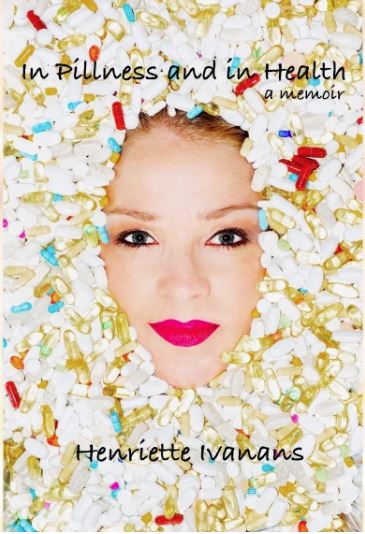Rejected by the traditional publishing world, this writer decided to DIY her book launch.
My road to being a self-published author began in rehab.
By HENRIETTE IVANANS MCINTYRE |
Picture it: 2011. A treatment facility just a 10-minute drive from the Hollywood Walk of Fame. I was a struggling actress with two kidney transplants and a massive addiction to prescription drugs. Every night, during the two hours my laptop was released from contraband, I would blog. By the end of my 60 days, I was driven to tell my story. But did the world really need another actress-turned-writer?
I had a great story. My husband gave me a kidney at the height of my drug addiction. Mine was a journey of falling out of love with pills to love myself and return to my husband.
But I had no idea how to write a book.
So in 2013, I took my first writing class through the UCLA Extension Writers’ Program. My instructor said, “You are a poet, but you don’t know how to write a scene.” With her old-school red Bic pen, she showed me the basics of how to do that: “I am 44. I am in a room. I am sitting on the floor.” I didn’t care if I looked dumb — I just kept asking questions about the writing process. I read, researched and reaped.
Two years, and many, many scenes later, I would win the Allegra Johnson Award in Memoir Writing given by the Writers’ Program.
Nobel Prize laureate Toni Morrison once said, “If there’s a book you want to read that has not been written yet, then you must write it.” I gave myself permission to have fun writing. That’s how I found my voice. My ugly, self-centered, radically honest, non-Jonathan Franzen, authentic voice. (I only got through half of “The Corrections.” There. I said it.)
In 2017, I finished my first draft after working with two book coaches over two years. They kept me accountable through weekly page submissions and had my story’s back. I had six readers give me their honest feedback on my first draft. One of them, a Hollywood screenwriter friend, offered me tough and brilliant insights.
Then against the advice of my book coaches, I shared my unfinished work on social media because I wanted to connect with people. To talk about addiction and kidney transplantation. I knew my work was good. It was truthful. First, one person responded. Then five. Then 20. Then someone wrote to me privately and said, “Thank you for your honesty. It’s made me realize I have a problem, too.”
In 2018, I had a manuscript I was proud of. I was ready to get a literary agent! I watched webinars on query letter writing. Hired an ex-literary agent to help me craft one. I was shocked — shocked! — the morning after those first five query letters went out and my inbox held no offer of representation. (Just a monthly reminder to pick up my medication.)
Quickly, I understood the literary world can be an exclusive club, no different from the Hollywood grind this relieved ex-actress had ditched. “It’s who you know,” the proverbial velvet rope. I had no connections. No Influencers. No college degree in literature, creative writing or even basket weaving — just an incomplete diploma from theater school.
During that year, I queried 85 agents and 25 publishers. They all said “No.” I threw the odd tantrum over the rejection, but understood it was possible to be talented, yet overlooked.
Finally, I held my nose and plunged into the deep end of self-publishing. I had been following industry newsletters for years, on the advice of my UCLA instructors. (One instructor had self-published her last book.) I looked to those trusted gurus for advice on publishing, book coaching and marketing.
I investigated the DIY options: self-publishing, where you do everything yourself, versus something called hybrid publishing, where an established publisher has to accept your manuscript then charges a fee to publish your book, from editing to cover design to distribution. They share your profits on the back end. That was not for me because 1) I wanted to be in complete control of my book and 2) there can be significant upfront costs and I was still paying off medical debt. Oh, and did I mention 3) I wanted to be in control?
My husband poured expired pills over my face, took my photo and together we created a beautiful cover. (Have fun, remember?) I built a website. Took a Writer’s Digest course on how to navigate through the Amazon Author platform. The course taught me how to format the paperback and e-book and to distribute the book. And as for figuring out IngramSpark, the distribution company for self-published works? Well, thank God for Google. (I’m still not sure I understand IngramSpark!)
On July 9, 2019, I sent “In Pillness and in Health: A Memoir” into the world on Amazon.
An article on my journey to “Pillness” landed the front page of the Arts section in the Winnipeg Free Press, from the town where I now live. On the same day, its independent bookstore chain, McNally Robinson, held a launch. The lesson here: Go local, folks.
Seventeen months later, I have sold 5,100 books, more than many traditionally published books. But it isn’t about the sales. (OK, maybe it’s a little about the sales. Most self-published authors only sell maybe 100-250 books in a lifetime.) I told and sold my story through pain, without an agent, editor, publisher, lawyer or publicist. I did not let the dictates of the traditional publishing world define my talent. Or lack of an Influencer influence my dream.
Today, I pitch, podcast and book club. But it’s welcome work. Writing has saved me as truly as the 12 Steps saved me in my journey through addiction.
Picture it: New Year’s Day, 2020. A reader from New Zealand reached out to thank me for writing “Pillness.” She said my story helped her understand how sick her ex was. That she could now stop blaming him and approach the situation differently.
No, I wasn’t reviewed by The New York Times. (Yet. “The Queen’s Gambit” is a bestseller 37 years after it was first printed.) But I have connected with readers through my story and maybe even made a difference in some lives. You never know the places you’ll go when you trust the unexpected twists and turns of a dream. And when you put the work in to do it well.
Maybe the world did need another actress-turned-writer after all.
This article appeared first on the OCRegister.com








